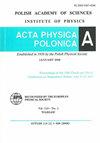用于中子计量的锂离子薄膜与硅探测器的研究与表征
IF 0.5
4区 物理与天体物理
Q4 PHYSICS, MULTIDISCIPLINARY
引用次数: 0
摘要
在过去的几十年里,人们在中子探测的新方法上做了大量的工作和发展,这些新方法将取代基于氦气的探测器。氦气探测器由于效率高而被广泛使用,但由于氦气的稀缺和成本高,这种探测器正在逐步淘汰。这项工作表明,无机材料(Si, 6 liff)的组合可以为开发新一代热中子探测器提供可行的基础。这种类型的器件是基于硅探测器耦合到6 liff薄膜转换器。在这项工作中,建立了一个基于硅探测器的模型,该探测器具有与6层不同厚度的liff薄膜相关的肖特基表面势垒。为了研究其作为不同薄膜厚度的函数的行为,使用来自源的热中子通量(AmBe-OB26)对模型进行了表征。初步结果表明,可以测量低能中子,平均探测效率约为1%,灵敏度为10±0。1 cps对3 H峰,不在乎伽马辐射< 10−6,薄膜的大小约2µm。在这篇文章中,我们将提出一个探测器设计的艺术状态,评估其特点(效率、分辨率、死时间,适当的运动),和一个澄清的其他参数对频谱的形状的影响,突出的可能性提高探测效率高,具有可与氦氦气体探测器相媲美的伽马/中子排斥能力。本文章由计算机程序翻译,如有差异,请以英文原文为准。
Study and Characterization of LiF Thin Film Combined with a Silicon Detector for Neutron Metrology
The last decades have seen a lot of work and development on new methods of neutron detection that would replace 3 He gas-based detectors, a device widely used due to its efficiency, which is being phased out due to the scarcity of 3 He gas and its high cost. The work showed that a combination of inorganic materials (Si, 6 LiF) could represent a viable basis for the development of new generations of thermal neutron detectors. This type of device is based on a silicon detector coupled to 6 LiF thin film converters. In this work, a model has been developed based on the fabricated silicon detector with a Schottky surface barrier associated with different thicknesses of 6 LiF films. To study its behavior as a function of the different film thicknesses, the model was characterized using a thermal neutron flux from the source (AmBe-OB26). Preliminary results show that it is possible to measure low-energy neutrons with an average detection efficiency of about 1%, a sensibility of 10 ± 0 . 1 cps on the 3 H peak, and insensibility to gamma radiation < 10 − 6 , with a thin films size of about 2 µ m. In this paper, we will present a state of the art of detector design, an evaluation of its characteristics (efficiency, resolution, dead time, proper motion), and a clarification of the influence of other parameters on the shape of the spectrum, highlighting the possibility of improving its detection efficiency to make it high, with a gamma/neutron rejection capability comparable to the 3 He gas detector.
求助全文
通过发布文献求助,成功后即可免费获取论文全文。
去求助
来源期刊

Acta Physica Polonica A
物理-物理:综合
CiteScore
1.50
自引率
0.00%
发文量
141
审稿时长
6 months
期刊介绍:
Contributions which report original research results
and reviews in the fields of General Physics, Atomic and
Molecular Physics, Optics and Quantum Optics, Quantum Information, Biophysics, Condensed Matter, and
Applied Physics are welcomed.
 求助内容:
求助内容: 应助结果提醒方式:
应助结果提醒方式:


